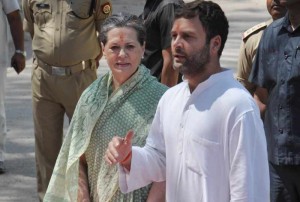 The imprecations directed at Rahul Gandhi – “joker” – and at his advisers – “rootless wonders and spineless creepers” – by sections of Congressmen and the recent signs of organizational disarray in several states suggest that it is still a far cry for the Congress where recovery is concerned.
The imprecations directed at Rahul Gandhi – “joker” – and at his advisers – “rootless wonders and spineless creepers” – by sections of Congressmen and the recent signs of organizational disarray in several states suggest that it is still a far cry for the Congress where recovery is concerned.
The revolts by two important functionaries – Narayan Rane in Maharashtra and Himanta Biswa Sarma in Assam – and by lesser known figures in Haryana, Jammu and West Bengal show that the aftershocks from the Lok Sabha poll debacle will take time to die down – if at all.
Such signs of anger and dissent are understandable in the wake of the party’s worst-ever performance. But what must be a cause of worry to its well-wishers is that the so-called high command appears to be unequal to the task of restoring calm and confidence.
While the former prime minister has sunk even further out of sight, especially after the latest allegations that Manmohan Singh winked at the shenanigans of a judge for the sake of placating a demanding political ally, the DMK, Congress president Sonia Gandhi and vice president Rahul Gandhi haven’t given any indication that they have become aware of the basic reasons for the setback.
One explanation for their silence is that they are waiting for the report on the defeat which is being prepared by A.K.Antony. While the former defence minister may not have been the right person for the job in view of his closeness to the Nehru-Gandhi dynasty, which is likely to prevent him from pointing out the family’s failures, it is odd that the report will be meant for Sonia Gandhi’s eyes only.
Even if bits and pieces of the document leak out, it will be another example – like the secrecy surrounding the Henderson-Brooke’s report on the 1962 Sino-India war – of the reluctance at the political and official levels to face the truth.
Such an ostrich-like approach is of little value, considering that at least some in the Congress have identified the main reason for its setback. As much is clear not only from the harsh comments quoted earlier but also from the observations of a former MP, Gulfaran-e-Azam.
According to him, “parents try to make sure that their children become doctors or engineers, but despite their best efforts, the children are not able to become doctors or engineers. For 10 years, you (Sonia Gandhi) tried to make Rahul a politician, but still he is not able to give a speech, nor has he developed any political acumen”.
For Gopal Krishna Gandhi, the Mahatma’s grandson, it isn’t so much the individuals who are at fault as the party itself which “thinks it is meant for the peacock throne from which alas the peacock has long since flown”.
Considering that he noted how the Congress has evicted leaders like Vallabhbhai Patel and Subhas Chandra Bose from its pantheon and even forgotten someone like Feroze Gandhi whose criticism of the Jawaharlal Nehru government was the “the stuff of a legend”, it is obvious that the former governor of West Bengal is not an admirer of the dynasty which presides over the party’s destiny.
If these critiques – three by Congressmen and one by an eminent outsider – are read together, it is clear that the party’s first family is being held responsible for the defeat.
It is unlikely, however, that the accusations will be taken to heart by the Congress. The ingrained habits of sycophancy will make most of the party members look everywhere but at the real cause for the reverses. Yet, curiously, their refusal to recognize the stark reality will not dispel the belief that the party is doomed.
Even if rebels like Rane and Sarma or those who want to join the Trinamool Congress in West Bengal are motivated by personal ambition and search for political safety, the fact remains that if the high command had given even a faint indication that it had discerned the faultlines, including its own lapses, then the self-seekers might have felt that there was some hope that corrective steps would be taken.
After all, politics is a game for winners where even the losers must feel reassured that their time will come. In the case of the Congress, this guarantee cannot be provided by a token offer to step down made by Sonia Gandhi (rejected by a chorus of orchestrated protests) and by perfunctory excuses, as by general secretary Digvijay Singh, that the party could not communicate its “achievements” to the voters.
Nor can it be provided by Rahul Gandhi’s game plan that the party must reach out to the Dalits, minorities and the poor. It is this division of the electorate into targeted groups which is responsible for the Congress’ plight, for it ignores the middle class and the corporate sector, which party spokesman Manish Tiwari saw as the mistake which it made.
In its heyday, the Congress success was based on its appeal to all sections of the people with the promise of stable, forward-looking, non-sectarian governance. Today, even the Bharatiya Janata Party (BJP) is realizing that identity politics does not help. But the rootless wonders and spineless creepers are still clutching at straws.